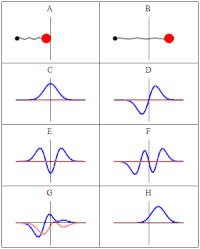
A simple approach towards the sign problem using path optimisation
Sign Up to like & getrecommendations! Published in 2018 at "Journal of High Energy Physics"
DOI: 10.1007/jhep12(2018)054
Abstract: A bstractWe suggest an approach for simulating theories with a sign problem that relies on optimisation of complex integration contours that are not restricted to lie along Lefschetz thimbles. To that end we consider the… read more here.
Keywords: sign; optimisation; simple approach; sign problem ... See more keywords

Complex Langevin and other approaches to the sign problem in quantum many-body physics
Sign Up to like & getrecommendations! Published in 2021 at "Physics Reports"
DOI: 10.1016/j.physrep.2020.09.002
Abstract: We review the theory and applications of complex stochastic quantization to the quantum many-body problem. Along the way, we present a brief overview of a number of ideas that either ameliorate or in some cases… read more here.
Keywords: many body; physics; problem; sign problem ... See more keywords

Application of a neural network to the sign problem via the path optimization method
Sign Up to like & getrecommendations! Published in 2018 at "Progress of Theoretical and Experimental Physics"
DOI: 10.1093/ptep/ptx191
Abstract: We introduce the feedforward neural network to attack the sign problem via the path optimization method. The variables of integration are complexified and the integration path is optimized in the complexified space by minimizing the… read more here.
Keywords: method; sign; optimization; path ... See more keywords

Scalable Emulation of Sign-Problem–Free Hamiltonians with Room-Temperature p -bits
Sign Up to like & getrecommendations! Published in 2019 at "Physical review applied"
DOI: 10.1103/physrevapplied.12.034061
Abstract: The growing field of quantum computing is based on the concept of a q-bit which is a delicate superposition of 0 and 1, requiring cryogenic temperatures for its physical realization along with challenging coherent coupling… read more here.
Keywords: sign problem; quantum; temperature bits; room temperature ... See more keywords

Numerically exact mimicking of quantum gas microscopy for interacting lattice fermions
Sign Up to like & getrecommendations! Published in 2021 at "Physical Review B"
DOI: 10.1103/physrevb.104.075155
Abstract: A numerical method is presented for reproducing fermionic quantum gas microscope experiments in equilibrium. By employing nested componentwise direct sampling of fermion pseudo-density matrices, as they arise naturally in determinantal quantum Monte Carlo (QMC) simulations,… read more here.
Keywords: sign problem; numerically exact; microscopy; quantum gas ... See more keywords

Sign problem in a Z3 -symmetric effective Polyakov-line model
Sign Up to like & getrecommendations! Published in 2017 at "Physical Review D"
DOI: 10.1103/physrevd.96.074031
Abstract: As an effective model corresponding to $Z_3$-symmetric QCD ($Z_3$-QCD), we construct a $Z_3$-symmetric effective Polyakov-line model ($Z_3$-EPLM) by using the logarithmic fermion effective action. Since $Z_3$-QCD tends to QCD in the zero temperature limit, $Z_3$-EPLM… read more here.
Keywords: sign; model; polyakov line; sign problem ... See more keywords

Solving fermion problems without solving the sign problem: Symmetry-breaking wave functions from similarity-transformed propagators for solving two-dimensional quantum dots.
Sign Up to like & getrecommendations! Published in 2020 at "Physical review. E"
DOI: 10.1103/physreve.101.043304
Abstract: It is well known that the use of the primitive second-order propagator in path-integral Monte Carlo calculations of many-fermion systems leads to the sign problem. This work will show that by using the similarity-transformed Fokker-Planck… read more here.
Keywords: sign problem; wave functions; similarity transformed;

No sign problem in one-dimensional path integral Monte Carlo simulation of fermions: A topological proof.
Sign Up to like & getrecommendations! Published in 2023 at "Physical review. E"
DOI: 10.1103/physreve.107.035305
Abstract: This paper shows that, in one dimension, due to its topology, a closed-loop product of short-time propagators is always positive, despite the fact that each antisymmetric free fermion propagator can be of either sign. read more here.
Keywords: problem one; sign problem; path integral; dimensional path ... See more keywords

Multiorbital Quantum Impurity Solver for General Interactions and Hybridizations.
Sign Up to like & getrecommendations! Published in 2020 at "Physical review letters"
DOI: 10.1103/physrevlett.124.206405
Abstract: We present a numerically exact inchworm Monte Carlo method for equilibrium multiorbital quantum impurity problems with general interactions and hybridizations. We show that the method, originally developed to overcome the dynamical sign problem in certain real-time… read more here.
Keywords: general interactions; multiorbital quantum; sign problem; quantum impurity ... See more keywords

Mitigating the Sign Problem through Basis Rotations.
Sign Up to like & getrecommendations! Published in 2021 at "Physical review letters"
DOI: 10.1103/physrevlett.126.216401
Abstract: Quantum Monte Carlo simulations of quantum many-body systems are plagued by the Fermion sign problem. The computational complexity of simulating Fermions scales exponentially in the projection time β and system size. The sign problem is basis… read more here.
Keywords: basis rotations; sign problem; basis; problem basis ... See more keywords

Quantized gravitational responses, the sign problem, and quantum complexity
Sign Up to like & getrecommendations! Published in 2017 at "Science Advances"
DOI: 10.1126/sciadv.1701758
Abstract: Energy transport in metals helps uncover a link between Einstein’s gravity and quantum computational complexity. It is believed that not all quantum systems can be simulated efficiently using classical computational resources. This notion is supported… read more here.
Keywords: gravitational responses; quantum; sign; quantized gravitational ... See more keywords